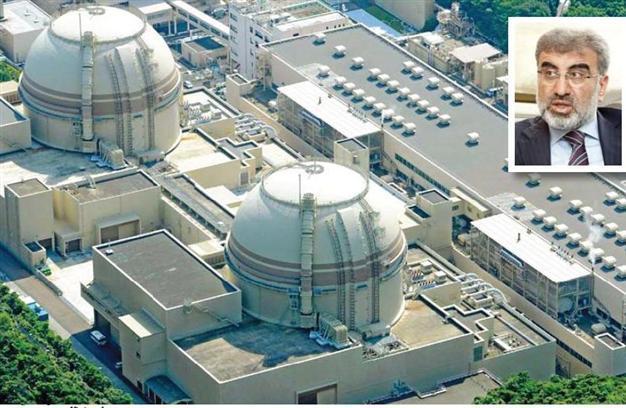Turkey plans to operate 3rd nuclear power plant
ANKARA - Hürriyet Daily News

‘Our plan is to be able to operate our third plant and build the majority of it, depending on the performance of the first two,’ Minister Taner Yıldız (inset) says. REUTERS photo
Turkey has announced plans to operate its third nuclear plant, most of the parts of which are planned to be built by national sources, but it acknowledges that it must be patient and cautious in kicking off the plans.
“Our plan is to be able to operate our third plant, and to build the majority of this plant - whether 60 or 80 percent of it I don’t know yet - depending on the performance of our first two nuclear plants,” Energy Minister Taner Yıldız told the Hürriyet Daily News in an interview on May 24.
Turkey recently concluded two major nuclear plant tenders with a Russian and Japanese-French consortium, and is thus planning to reduce its natural gas imports over the next decade as the plants become operational. According to Yıldız, the government has already started making plans on the third nuclear plant, as the growing domestic energy needs are unlikely to be met by the first two.
“We will not rush to decide on the third plan, but we have already prepared our negotiation dossier. We could swiftly conclude the procedures, but our prime minister gave us another target,” Yıldız said, adding that this target was to build the third plant mostly using the country’s own national sources.
Acknowledging that it would not be possible for Turkey to construct 100 percent of a nuclear plant, Yıldız said a good majority could be made with national resources.
The plans for the third plant are still vague, but Yıldız said the government would not be waiting until the first two nuclear plants’ become operational to decide on the third one, as even choosing a site for the construction takes two years.
Targeting the building a local nuclear plant as a target would also help Turkey upgrade its industrial base and allow it to move to another league, he argued. “Nothing can be achieved without first setting targets. I could put 2025 as target, and someone may say it can’t be done before 2035. Whatever we say, we should first set a target. Turkey’s nuclear energy projects are very important for the further industrialization of the country, as it will set a new market in the country,” Yıldız said.
Addressing criticisms from anti-nuclear energy circles, Yıldız said Turkey was obliged to diversify its energy sources given its growing economy and simultaneously increasing energy needs. “They ask why there is no investment in solar energy or wind energy? This is because when the wind does not blow or the sun does not shine you cannot produce energy. This is what we call energy diversification,” he said.
Diversifying sources
Turkey is also working to diversify energy source countries, even making calls to southern neighbors Israel and Greek Cyprus to say it is open to cooperation with them to allow both natural gas and oil to flow via Turkey, once political stability is achieved in the region.
According to Minister Yıldız, Turkey will reduce the amount of imported natural gas worth $7.2 billion with the operation of its first two nuclear plants.
Another achievement of entering into the nuclear energy world is that Turkey could get know-how and train its own experts and scientists in due course. Yıldız said the deal with Japan for the construction of the $22 billion-worth second nuclear plant also includes the establishment of a Turkish-Japanese Technology University, in which Turkey could benefit from Japanese nuclear energy technology. “To what extent could this technology be shared? Maybe not of all of it in the first year, because it has also its own culture. Our students, academics, engineers will take benefits from it step by step, which will perhaps take 10 or 20 years,” he stressed.
This technology base will serve at an axis between central European and Gulf countries, Yıldız said, giving particular emphasis to Middle Eastern countries who have long suffered from internal conflicts and failed to create their own industrial capacity. “This region is not going to be in the same way forever. Countries like Iraq and Syria, who are tired [of turmoil], will surely find their correct regimes. They will also adopt industrial regimes. The [industrial] production base of these countries will be Turkey. This is the most serious investment we are making for the future,” he said.
Turkey’s deal with a Japanese-French consortium for the construction of the second nuclear plant has also received praise from the United States, Yıldız said. “From the technological perspective, our deal with Japan was very meaningful, the Americans told us,” he said. He had talks with acting Secretary of Energy Daniel Coleman and the U.S. president’s special envoy, Carlos Pascual, on May 16 in Washington.
